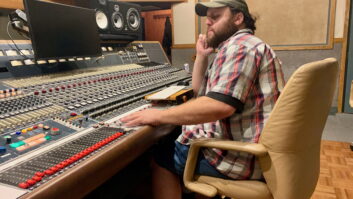
Managing Director of Media UK James Cridland. Credit James Cridland OTTAWA, Ontario — The June 10, 2013 launch of Apple’s iTunes Radio, with its Pandora-like mix of ad-supported free content and ad-free paid content, fired worldwide debate about this behemoth’s potential impact on Internet radio.
The big question: Will iTunes Radio spur more people to tune into Internet radio as a medium, or will it seize the market from Pandora, Spotify and thousands of standalone Internet radio stations on the Web?
To tackle these and other concerns, RadioNet turned to James Cridland and Fred Jacobs, both respected experts on Internet radio. James Cridland is managing director of Media UK, the free portal for everything in U.K. media. Jacobs is president of the radio consultancy Jacobs Media, and the man widely acknowledged as inventing the “Classic Rock” radio format in 1983.
Just how big (or not big) an event is the entry of Apple into the Internet radio market? That’s the question on everyone’s lips as they try to assess whether the company that has already sold 25 billion songs on iTunes is about to impose its will on Internet radio.
THE BIG PICTURE
Certainly Fred Jacobs was impressed. “It’s a big deal,” he said. “Whether Apple promotes it on all cylinders is a factor, but any time this company takes on something new — and in this case, part of a space they already excel in, which is music — you have to respect the entry.” However, James Cridland was anything but impressed.
“They haven’t entered the Internet radio market; they’ve entered the Internet algorithmic jukebox market,” he said. “Which is lovely, but they’re not radio, and them stealing the radio name and passing off their product as ‘radio’ isn’t fooling anyone.” Semantics notwithstanding, Cridland admitted that iTunes Radio does have a real advantage — even if it is a “me-too product” — due to Apple’s powerful distribution network. He considers the service attractive for anyone with an “iOS device and any device that has iTunes already installed, so PCs and Macs.”

Jacobs Media President Fred Jacobs. Credit Fred Jacobs With 70 million and 24 million users respectively, Pandora and Spotify are well established in the Internet radio medium. CONSEQUENCES
Once again, Fred Jacobs disagreed. “It could affect them heavily, depending on which of the two services it is most similar to,” he said. “There’s not a great deal of loyalty in this space. Consumers will gravitate to the music service that’s offering the best deal at the moment, so existing pure plays are in the crosshairs.”
The great joy of Internet radio, from a listener’s standpoint, is the wealth of station genres and broadcast locations that are easily accessible via the Web. But convenience is another consideration, and iTunes Radio — like Pandora — makes it easy to get all kinds of music through one convenient portal. So what does its existence mean for standalone Internet stations lacking Apple’s marketing clout and deep pockets?
Jacobs isn’t sure. “On the one hand, Apple coming in legitimizes and mainstreams the space,” he said. “On the other, it adds to the confusion. Google’s service, and even MySpace’s new version of radio may actually make it more confusing for consumers to sort them all out.”
Cridland had no such doubts. “I think you’re comparing chalk with cheese,” he said. “Lots of people like radio. Some people — a tiny minority — quite enjoy algorithmic jukeboxes like iTunes Radio. Sure, it’ll damage Internet radio stations that offer nothing more than nonstop music; but then, that’s the difference between radio and an algorithmic jukebox.”
When Internet radio started, there was no Pandora, Spotify or iTunes Radio. But times have changed, and now these players command a lot of listeners online and on mobile.
So is the Internet transforming from a universe of stations to a popular oligarchy of major music services? “I don’t see any evidence of any loss of audience to any online service as a result of Pandora,” Cridland said. “I think it’s helping to grow the universe.”
WHO LIVES, DIES
Perhaps, however, “you can visualize how, like in other businesses, a few mega brands will survive, leaving smaller ones at the very end of the long tail,” said Jacobs.
So what will determine which Internet radio stations thrive or dive? “Ultimately, it will come down to the same marketing differences that impact other verticals,” he said. “What’s different about your service, what does it offer that the others can’t — what’s the value proposition? If it’s just like everything else — and not supported with a back end like iTunes, it’s hard to imagine that tertiary services can survive.”
To conclude this discussion of iTunes Radio’s impact on Internet radio, RadioNet asked our experts where they expected the medium to be in a year’s time?
For his part, Fred Jacobs was bullish. “Internet radio continues to become more mainstream over time,” he declared. “In our newest Techsurvey, we now show 45 percent of our radiocentric audience using streaming audio weekly — an increase of 18 percent year-to-year. Among younger alternative fans, it’s closer to 70 percent. And as mobile devices and cars support and showcase the technology, there is a great deal of growth ahead.”
As for Cridland, he said that given the choice between Internet radio and algorithmic jukebox services, “I think Internet radio will continue to do well and focus on personalization and non-music content, to continue pulling in the audiences. I think algorithmic jukebox services like iTunes Radio will also do well, and at some stage might sound better than just a bunch of disjointed music audio files thrown together and put on shuffle.”
He adds a million-dollar question: “Won’t it be interesting if someone — Pandora or Apple or someone else — actually discovers a business model that actually earns a profit?”
James Careless reports on the industry for Radio World from Ottawa, Canada.







